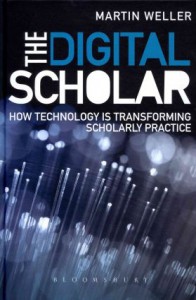Category: Academia
A Closing Thought (for now) about Digital Scholarship
 Hard to believe that our week in thinking and processing and learning and discussing digital scholarship has come to a close. In many ways, I feel I have just scratched the surface of this area, and am beginning to appreciate how the facilitators of the #change11 MOOC scheduled this in such a rapid manner to give sufficient taste of different topics, with individual freedom to stop and spend more or less time with a topic as we are moved to.
Hard to believe that our week in thinking and processing and learning and discussing digital scholarship has come to a close. In many ways, I feel I have just scratched the surface of this area, and am beginning to appreciate how the facilitators of the #change11 MOOC scheduled this in such a rapid manner to give sufficient taste of different topics, with individual freedom to stop and spend more or less time with a topic as we are moved to.
With enough of a taste of digital scholarship, I fully think I will revisit this area and new verbiage I am acquiring.
I read some chunks of the session facilitator Martin Weller’s new text The Digital Scholar (available for free online), though think the content is such that I need to see the book in a more holistic manner (and thus pre-ordered it on Amazon). During the session, I asked Martin a question at the end of his presentation:
Can you clarify how “digital scholarship” fits with or is different from Internet Research and TEL? In other words, to what extent is this term becoming more widely known/ how does it fit into a traditional disciplines?
To give some background to this question, I am working on a PhD in E-Research and Technology Enhanced Learning at Lancaster University, and have been searching for some term to capture many of the keywords I selected for my public profile at Lancaster University, where I study in the Graduate School Faculty of Arts and Social Sciences. That, in light of my blog by-line “Educational Research + (Virtual) Identity in Postmodernity,” makes me wonder if digital scholarship as a term may be something that I incorporate into my own developing research identity?
Perhaps it may come into my professional and academic work once I finish my formal studies? Only time will tell.
Digital Scholarship and You (or me!) in #change11
In this context, Chap 5 of the text makes an interesting claim that is somewhat applicable for my own doctoral research:
There is a general suspicion around using social networks to share findings, although many researchers use them for personal and professional networking (James 2009; Carpenter 2010). Carpenter et al. describe researchers as ‘risk averse’ and ‘behind the curve in using digital technology’. Similarly Harley et al. (2010) state that ‘we found no evidence to suggest that “tech-savvy” young graduate students, postdoctoral scholars, or assistant professors are bucking traditional publishing practices’.
I use social networks for both personal and professional networking (though I still do not like the term networking, as I often consider it rather one-sided–people network to get, and not to give or share or collaborate), and I also find such networks fundamental to identifying and accessing research participants themselves. On top of that, I even use these technologies (especially through my Twitter account) to help myself think through and initiate research projects. The most valuable of these online communities I have found for my doctoral research is the Twitter-based #phdchat, what has become the hub of my online presence for personal and digital scholarship, support, and friendship.
As an early career researcher myself, I find the related JISC-funded The Lives and Technologies of Early Career Researchers. As the study (pg. 1) found:
Despite many ECRs being interested in trying out new technologies, 72% of early career researchers reported that they did not even use Web 2.0 or social media to share their research. This may reflect the many and varied constraints which limit ICT take-up amongst early career researchers, perhaps including norms of secrecy in research practice; this study found social, confidence, skills, institutional and participatory constraints on technology use by ECRs.
This gets me thinking–I use these technologies to think through and clarify my research direction, along with access partipants and then get feedback on the process and my research design. I do not ordinarily share results online. I wonder if this is due to the great gap in time between those first steps and the findings, or perhaps because, here in my doctoral work, I do not yet have findings to share? Only time (and more discussion, perhaps) will tell.
I Finished Data Collection!
 I am happy to share that I have completed data collection for my doctoral thesis research!
I am happy to share that I have completed data collection for my doctoral thesis research!
It has been four weeks filled with countless interviews, discussions, explanation about my research, national and international phone calls, Skype sessions, and more support than I ever dreamed of. Having engaged in research interviews several times during my course of study, I knew a little about what to expect in these interviews. What I did not expect was a consistent sense of well-wishes, encouragement, interest, and positive energy on behalf of my many participants during this period. In many ways I feel like I engaged in conversations, rather than data collection. What better way is there to think about our research, especially research that in one sense involves colleagues, however far and distant and heretofore unknown?
Thanks to so many people, I feel I have now passed over this step, and while transcription and sense-making await, I am very thankful that I have turned this corner in my work.
I look forward to now trying to make sense of everything I heard, and hope to continue to share and discuss this with my colleagues, old and new, over the next several months.
Doctoral Thesis Data Collection, Status #2: Emotions
While I am not beginning any systematic processing of this data yet (transcription, anyone? 😉 !!), there is one thing that I have learned in this process that I want to share for the benefit of anybody else planning a similar research endeavor. Data collection in the form of long, in-depth interviews takes a lot of energy. Moreover, I am finding that it takes almost everything out of me. Let me explain.
My research asks about barriers and liminal (in-between) periods that happen during doctoral study, resulting in some form of an aha! or new sense of one’s identity. This often involves the telling of difficult stories, ones that are personal and oftentimes riveting in nature. Being privelged with listening to these stories is a rich experience, one that requires my full attention in way unlike many of the other tasks I have encountered in research (or practice, for that matter). I feel emotionally humbled when I finish with each one, and find that I struggle to do my ordinary work or other commitments in life during this period.
I am thankful for this opportunity to engage in this study, as it is a deeply moving experience. I think I have a lot more to process in its effect in me, much less as part of my research.